Germany job market guide 2026: How expats can find work and thrive
Just landed in Germany and ready to work?
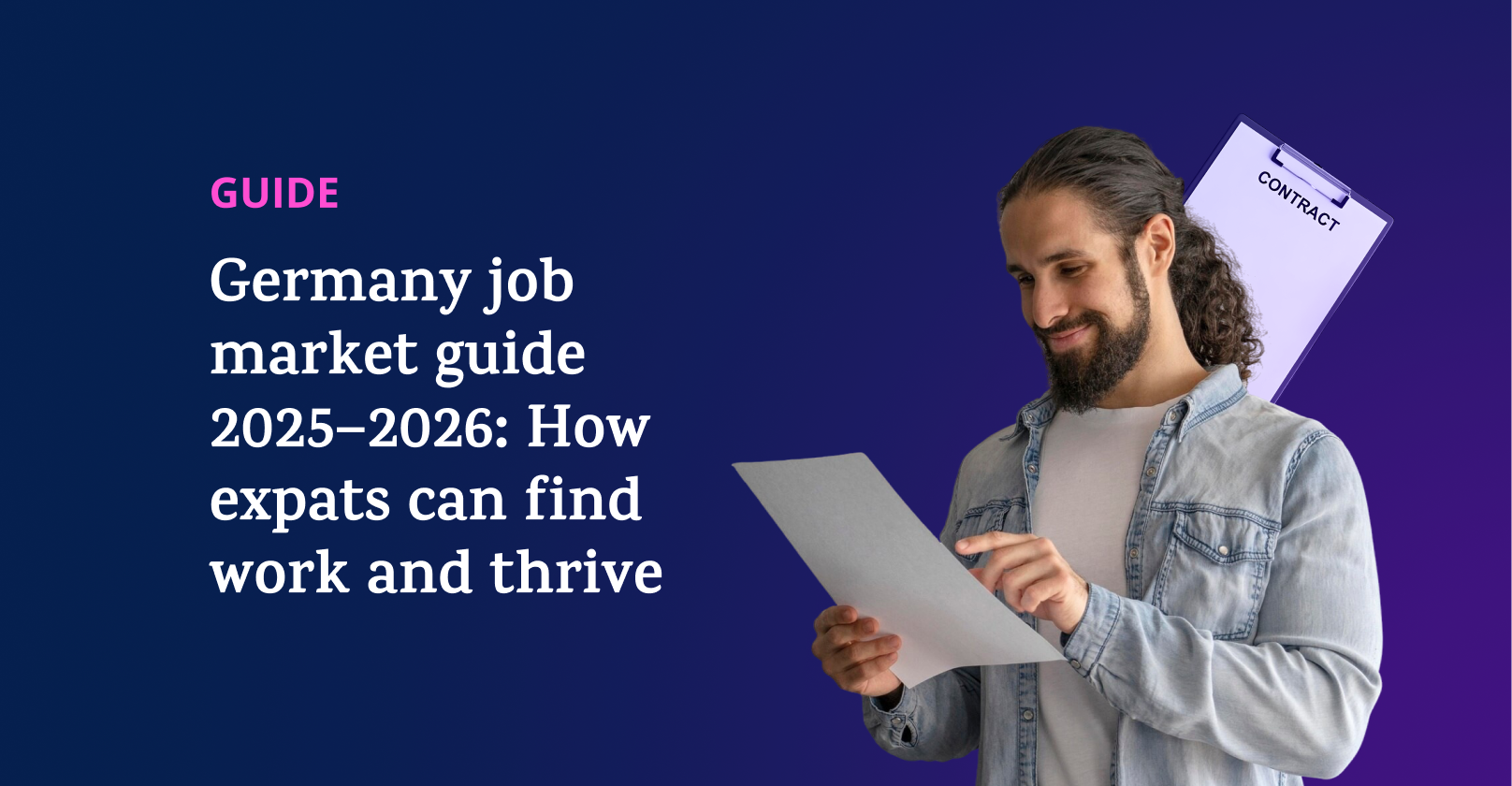
Here’s your quick-start guide to navigating job ads, spotting real opportunities and decoding what salary numbers actually mean. We’ll also tackle the mother of all questions: how much German do you really need to land a job? This guide will cover:
- Where the jobs are in 2026: Which industries are really hiring?
- Decoding German job ads: Hidden cues that reveal what recruiters really mean.
- Where to look for work: Go beyond LinkedIn and uncover the unadvertised opportunities that most expats miss.
- What to expect after you’ve applied: Timelines, paperwork and how to follow up the German way.
- Understanding the German job market in 2026
- Reading and decoding German job ads
- How to find jobs in Germany
- What to expect in Germany’s job market in 2026 and beyond
- Credential recognition in Germany (‘Anerkennung’)
- FAQs
Understanding the German job market in 2026
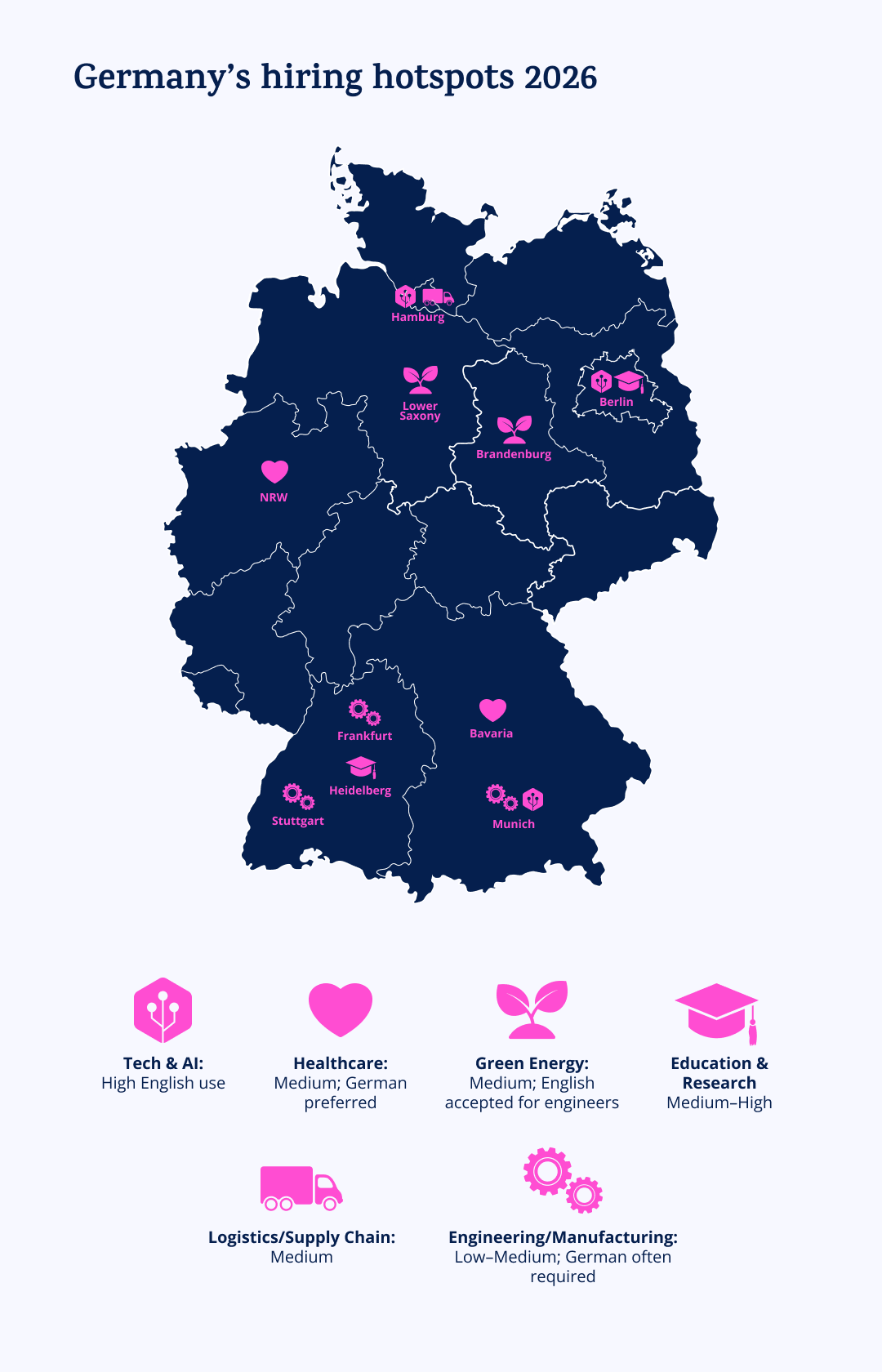
Where jobs are growing in 2026
Tech, healthcare and green energy are among the top hiring sectors in Germany for 2026, but where you apply makes all the difference. Regional variation is huge. Germany isn’t one job market; it’s several, and each has its own quirks and language expectations.
| Industry | Regional hubs | English-friendliness |
| Tech and AI | Berlin Munich Hamburg | High: Often used in startups and IT teams |
| Healthcare (e.g., Nursing) | Bavaria North Rhine-Westphalia | Medium: German preferred, but English hires are rising due to shortages |
| Green energy | Lower Saxony Brandenburg | Medium: English accepted for engineers and project roles |
| Engineering and manufacturing | Stuttgart Munich | Low to medium: German required for client and team communication |
| Logistics and supply chain | Hamburg Frankfurt | Medium: Mainly in international companies |
| Education and research | Berlin Heidelberg | Medium to high: Common in universities and research centers |
Hiring norms and timelines in Germany
German hiring tends to be a formal process, with slightly slower response times than you might expect. On the plus side, it’s generally reliable. Expect detailed paperwork, structured interviews and long waiting periods between steps. Don’t lose hope: if a company likes you, they’ll follow through — even if it takes a few weeks. What feels like the cold shoulder is often just bureaucracy in action.
Myth vs. reality
| Myth | Reality |
| “They didn’t reply for two weeks — I’m out.” | Nope. HR might still be collecting approvals or verifying diplomas. |
| “German companies hire quickly if they like you.” | Hiring usually takes 4–6 weeks, even for urgent roles. |
| “If I don’t tick every box, I shouldn’t apply.” | Apply anyway. Many “must-haves” are wish-list items, not deal-breakers. |
| “I should call to speed things up.” | Don’t. Follow up politely after 2–3 weeks — Germans respect process, not pressure. |
Typical hiring timeline
The typical hiring process in Germany takes 4–6 weeks. Here’s a breakdown of what happens behind the scenes.
| Stage | Duration | What happens |
| Application submitted | Day 1 | Automated confirmation of application receipt |
| Review period | 1–3 weeks | HR screens documents and may check references |
| Interview phase | 1–2 weeks | Usually 1–2 rounds, often with a skills test or case study |
| Decision and offer | 1 week | Contract drafted, salary confirmed, onboarding planned |
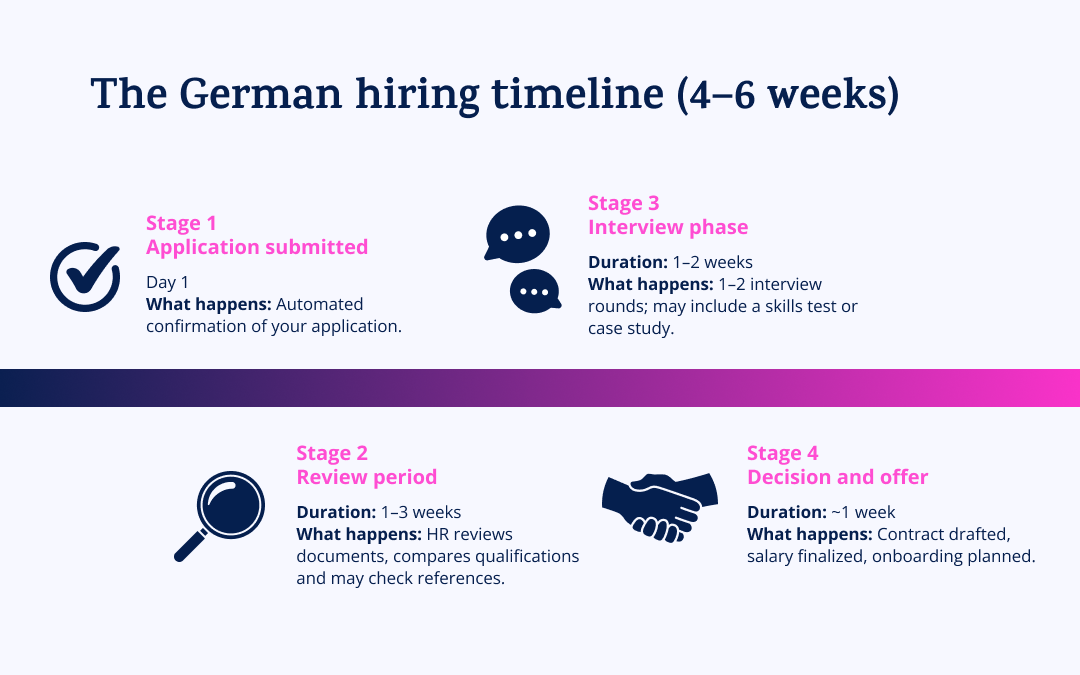
Reading and decoding German job ads
German listings love structure, bullet points and long compound words that test even native speakers. Once you understand the logic, you’ll spot the cues that matter for international applicants.
German job titles that confuse foreigners
German job titles often describe tasks, rather than status. This is practical, though it might confuse newcomers. Many job titles sound far more complex than they actually are, and they may even seem downright funny in translation.
Glossary: Common German job titles decoded
| German title | Real meaning (in English) | Misleading English translation |
| Sachbearbeiter/in | Administrative or case officer | Bear handler |
| Werkstudent/in | Working student (part-time) | Factory worker |
| Kaufmännischer Angestellter/in | Business or administrative clerk | Shop assistant |
| Erzieher/in | Childcare worker/educator | Animal trainer |
| Mechatroniker/in | Mechanical/electrical technician | Robot scientist |
| Hausmeister/in | Building caretaker/janitor | Home master |
| Bürokaufmann/-frau | Office administrator | Businessman/woman |
| Vertriebsmitarbeiter/in | Sales representative | Delivery driver |
| Personalsachbearbeiter/in | HR administrator | Personal assistant |
Anatomy of a German job ad
Most job ads in Germany follow a three-part formula:
- Aufgaben (tasks)
- Profil (requirements)
- Wir bieten (what the company offers)
Here’s how the structure typically looks:
| What it means | Typical contents | |
| Aufgaben (your tasks) | What you’ll actually do in the role | Bullet points like “Koordination von Projekten” (project coordination) or “Kommunikation mit Kunden” (client communication) Often a mix of real duties and wish-list items |
| Profil (your profile) | The “who you are” section | Lists required degrees, certificates or experience. Germans love specifics. |
| Wir bieten (we offer) | The perks | Flexible hours, hybrid work, Jobrad (bike leasing), training budgets and 25–30 vacation days Modesty is typical. Flashy benefits are rare. |
Must-have vs. nice-to-have requirements
“Muss” means essential. “Kann” means nice to have.
German employers often describe their ideal candidate in an ad, which isn’t necessarily the one they’ll hire. If you meet about 70% of the listed criteria, go ahead and apply anyway.
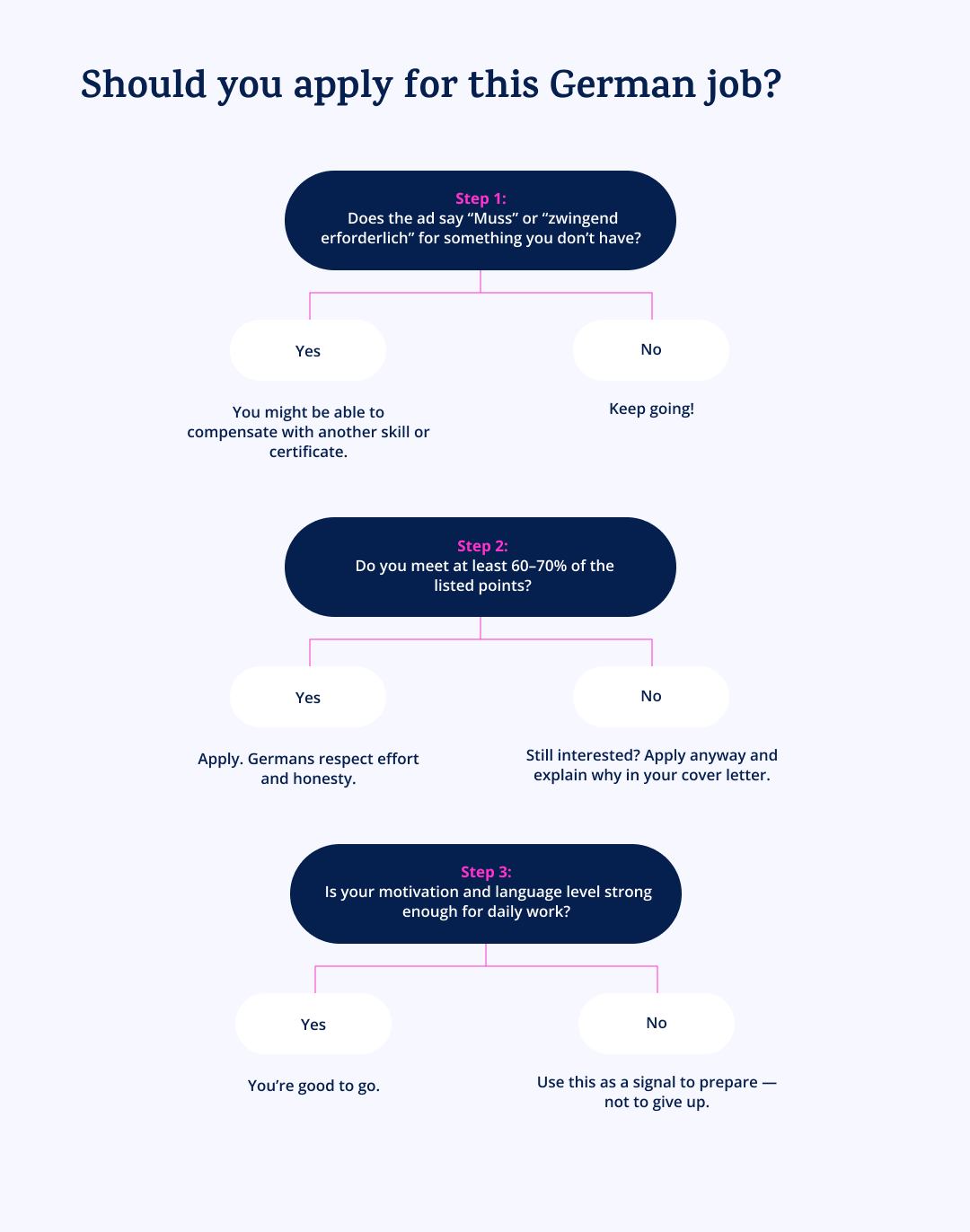
Most German hiring managers care about reliability and fit more than perfection. So, if you bring motivation, professionalism and a bit of Eigeninitiative, you already stand out from the crowd.
How to find jobs in Germany
Finding a job in Germany takes more than just LinkedIn. While the major international jobs site is certainly popular in Germany, many of the best opportunities are listed on niche platforms or filled through referrals before they ever go public. Knowing where to look can save time and uncover roles that are perfect for internationals.
Best job platforms for internationals
StepStone, Indeed.de and BerlinStartupJobs are essential starting points. Each platform has its strengths depending on the industry, region and language requirements.
| Best for | English-friendly? | |
| StepStone | Broad range of industries, from tech to healthcare | Medium: Most ads are in German, but you can filter for English roles |
| Indeed.de | Large database, including smaller companies | Medium: Many ads in German, some in English |
| BerlinStartupJobs | Startup, tech and creative roles | High: English is commonly used |
| Networking and job listings (German equivalent of LinkedIn) | Low to medium: Mostly German users | |
| Monster.de | Traditional industries, HR and engineering | Medium: German ads dominate |
| Jobs in Berlin | Berlin-based startup and service roles | High: English-friendly and curated for internationals |
| Glassdoor Germany | Company reviews and job listings | Medium: Mixed language, useful for company insights |
Using multiple sources and mixing job boards with networking gives you the best shot at finding the right position.
Hidden job market strategies
An estimated 50–70% of roles in Germany are filled informally, through referrals and networks. Many positions go straight to candidates via recommendations, professional contacts or casual conversations.
3 networking tactics that work
- XING (German LinkedIn)
→ Create a complete profile in German and English. Join industry groups and engage in discussions. Recruiters actively search for candidates here. - LinkedIn outreach
→ Connect with hiring managers, alumni or professionals in your target companies. A polite message showing genuine interest can open doors faster than an online application. - Local meetups and professional events
→ Attend conferences, workshops and informal meetups (including Stammtisch-style gatherings). Casual networking often leads to referrals that are never advertised.
Consistency is key. Follow up, maintain relationships and show your enthusiasm. In Germany, trust and personal connection often outweigh flashy resumes.
Do you need German? Industry-by-industry roadmap
Work in tech? You might thrive in an English-only team. But in HR or healthcare, fluent German is nearly non-negotiable. Language expectations vary widely, so matching your CEFR level to your target industry can help you plan your job search effectively.
CEFR language roadmap for German jobs
| Industry | Minimum German level | Why you need it |
| IT/tech | B1–B2 | English is often sufficient, but basic German helps with team communication and local clients. |
| HR/recruiting | C1 | Fluent German is required for interviews, contracts and internal communication. |
| Healthcare/nursing | C1–C2 | Patient care and documentation are often fully in German. Language proficiency is non-negotiable. |
| Engineering/manufacturing | B2 | Technical manuals may be in German, but meetings require intermediate proficiency. |
| Education | B2–C1 | Teaching and student interaction usually require solid German, though research may be primarily in English. |
| Customer Service/hospitality | B1–B2 | Daily interactions with customers are in German, and you’ll need it to handle complaints and requests. |
| Marketing/communications | B2 | Writing, PR and social media often require professional-level German. |
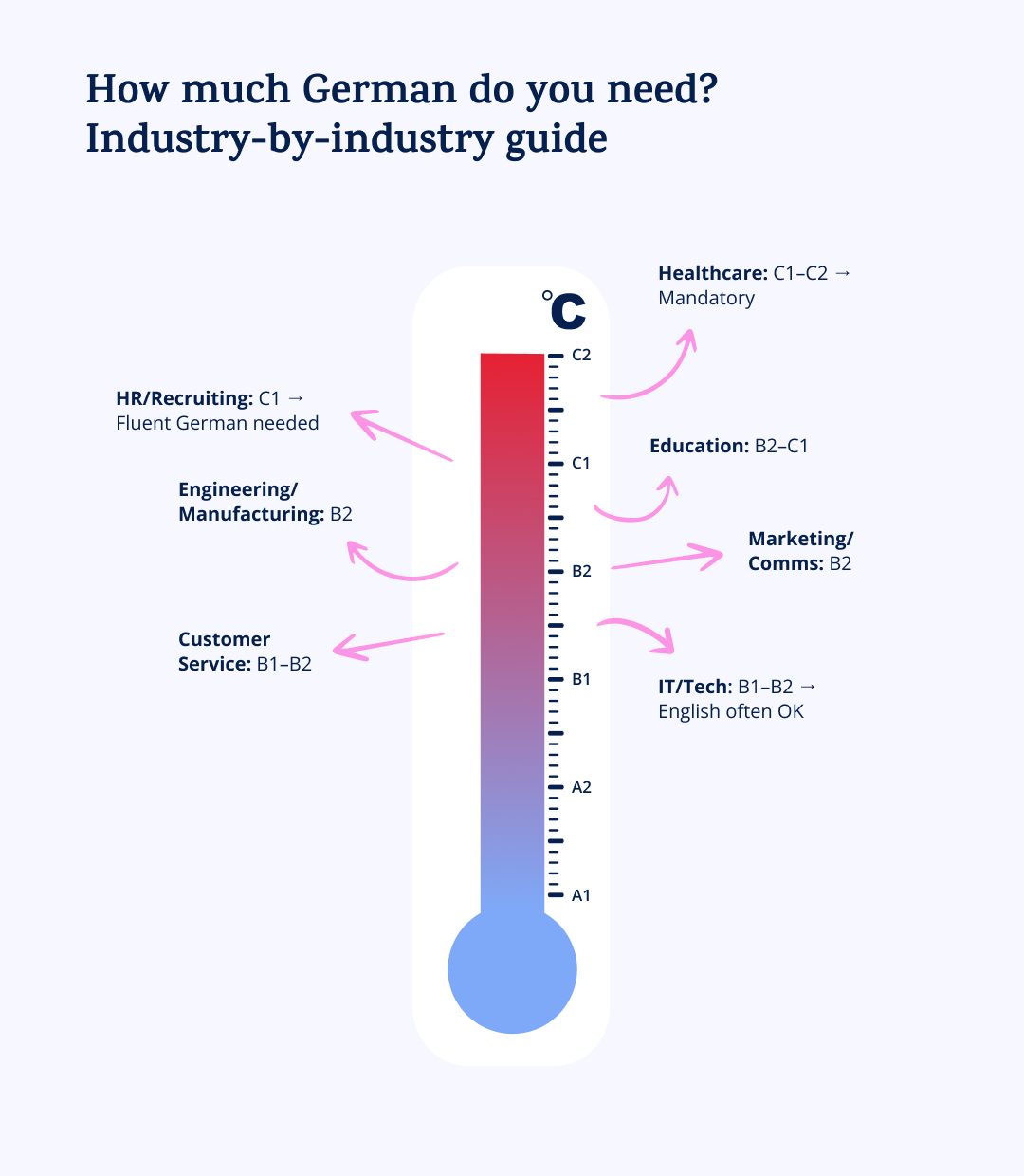
Pro tip: Most job ads in Germany are still in German; in fact, 99% of ads require some German. Even if the company uses English internally, having at least B1–B2 will open many more doors.
Understanding German contract types
Employment contracts in Germany come in several forms. Permanent (unbefristet) contracts are the most secure from the employee’s perspective, but fixed-term (befristet) contracts are very common.
Contract comparison: Quick guide
| Duration | Pros | Cons | |
| Unbefristet (Permanent) | Unlimited | Job security, benefits, easier long-term planning | Usually requires probation; slower to get hired |
| Befristet (Fixed-term) | Defined end date (e.g., 6–24 months) | Easier to enter; often used for projects | Less job security, fewer benefits; may need a new job after the contract ends |
| Freelance/Selbstständig | Project-based/variable | Flexibility, higher hourly rates | No guaranteed income; you’re responsible for taxes and insurance |
| Mini-job/Teilzeit | Part-time | Low stress, flexible hours | Limited pay, fewer benefits, less career growth |
Probation period (‘Probezeit’)
Most contracts start with a six-month probation period (Probezeit). During this time, either party can terminate the contract with two weeks’ notice. This is a legal standard, so you shouldn’t confuse it for a red flag.
Notice periods (‘Kündigungsfrist’)
After probation, the typical rule for providing notice (Kündigungsfrist) is to do so one month to the end of the calendar month, increasing with tenure. These structured timelines protect both sides, but they can surprise newcomers more accustomed to quick resignations.
What to expect in Germany’s job market in 2026 and beyond
Future-proof skills for 2026
Germany’s economy is shifting toward AI, green energy and healthcare. But regardless of industry, employers increasingly seek candidates who combine technical expertise with adaptability and cross-cultural skills.
Key skills to focus on:
- AI and data analytics: Understanding AI tools, machine-learning basics and data-driven decision-making
- Green energy and sustainability: Knowledge of renewable energy, circular economy and ESG principles
- Healthcare and life sciences: Digital health, patient-management systems and biotech innovations
- Adaptability and problem-solving: Ability to pivot, learn new tools and respond to change quickly
- Cross-cultural collaboration: Comfort working in diverse teams, especially in international companies
Pro tip: Even if your main expertise isn’t in these sectors, highlighting digital skills, flexibility and international experience can help make you more “future-proof” in Germany’s evolving job market.
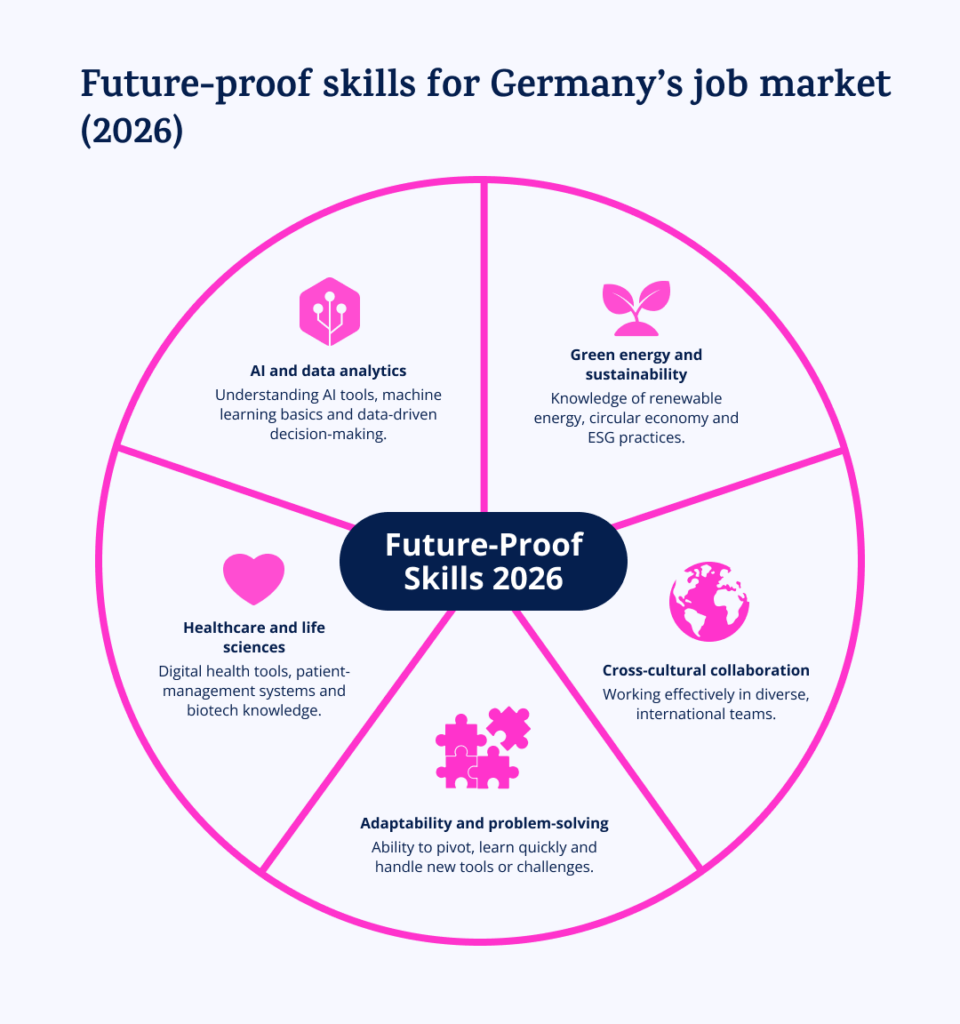
Employer expectations for international professionals in 2026
By 2026, employers will prioritize long-term commitment, language learning and digital competence. Companies want international hires who integrate well and plan to stay.
5 green flags employers will still love in 2026
- Long-term commitment: Demonstrating you’re not just passing through; employers value stability
Language investment: Knowledge of German (even B1–B2 level) - Digital literacy: Comfort with modern tools, remote collaboration and tech-driven workflows
- Cultural adaptability: Ability to work in diverse, international teams with empathy and flexibility
- Proactive learning mindset: Continuously upskilling in your field and related areas
Pro tip: Highlight these green flags in your CV, cover letter and interviews. Companies notice when international professionals make the extra effort to align with German work culture.
Salary and benefits outlook in 2026
Wages are forecast to rise moderately through 2026, particularly in tech, green energy and healthcare. Employers are competing for skilled professionals, offering flexible hours, remote options and training budgets as standard perks.
However, taxes and social contributions remain high, meaning your net pay (Netto) may grow more slowly than your gross salary (Brutto). Always compare offers using a Brutto-Netto calculator to estimate your take-home pay accurately.
Regional salary and German-language friendliness overview
| Region | Salary level | English-friendly roles | Notes |
| Berlin/Brandenburg | Medium–high | High | Startups and tech are very English-friendly |
| Munich/Bavaria | High | Medium | Tech and engineering; healthcare requires German |
| Hamburg/North Germany | Medium | Medium | Logistics, trade, IT; mixed English options |
| Frankfurt/Rhine-Main | High | Medium | Finance and IT; English in multinational companies |
| East Germany/Leipzig/Dresden | Medium | Low–medium | Growing tech hubs; fewer English-only roles |
| Rural areas | Low–medium | Low | German is almost always required |
Pro tip: Southern and western cities (e.g., Munich, Frankfurt, Stuttgart) offer higher salaries, but living costs are higher, too. Urban centers also offer more English-speaking roles, especially in tech and startups.
Gross pay vs. net pay example (2025 typical salary; tax class I)
| Gross annual salary | Net monthly income | Notes |
| €40,000 | ~€2,400 | Typical for mid-level IT or admin roles |
| €55,000 | ~€3,200 | Mid-level engineer/healthcare professional |
| €70,000 | ~€4,000 | Senior IT, management or specialized healthcare |
Source for calculation: Brutto-Netto calculators online (e.g., Nettolohn.de)
Understanding both regional variations and gross-to-net realities helps expats realistically compare offers and plan their finances in Germany.
Credential recognition in Germany (‘Anerkennung’)
To work in certain regulated fields in Germany, you may need your foreign degree or professional qualifications to be officially recognized. This process, called Anerkennung, confirms that your education meets German standards and that you’re legally allowed to work in fields such as healthcare, education, engineering and the skilled trades.
Skipping this step can delay job applications or even make some roles off-limits, so it’s better to start early.
Step-by-step checklist for ‘Anerkennung’
- Determine whether your profession is regulated. Check if your field requires recognition. Healthcare, teaching, engineering, law and some trades usually do.
- Compare your credentials. Use Anabin, Germany’s database for foreign degrees, to see if your diploma is considered equivalent.
- Contact the relevant authority. Depending on your profession, this could be a professional chamber (Kammer), state authority or federal office (e.g., ZAB – Central Office for Foreign Education).
- Submit required documents. Typical documents include your diploma, transcript, CV and proof of professional experience. Certified translations in German are usually required.
- Receive recognition decision.
You’ll get one of three outcomes:
- Full recognition: Your qualification is equivalent.
- Partial recognition: You may need extra training or an exam.
- No recognition: Further education or retraining may be required.
Pro tip: Start the Anerkennung process early — ideally before moving to Germany. It can save months of waiting and make your job search much smoother.
FAQs
Do I need German language skills to get a job in Germany, and how good must my German be?
It depends on the field. In IT, tech and the startup scene, English often works, though basic German (B1–B2) helps with daily life and teamwork. In healthcare, education and HR, fluent German (C1–C2) is usually required.
Can I apply for German jobs if I don’t meet all the listed requirements?
Yes. Few candidates match every “must-have.” If you cover about 60–70%, apply anyway and show motivation, adaptability and a willingness to learn.
How do gross salary offers translate into net take-home pay after taxes and social contributions?
Gross (Brutto) is your pay before deductions; net (Netto) is your take-home pay. Taxes and insurance typically reduce income by roughly 35–40%. For example, €55,000 gross ≈ €3,200 net monthly take-home pay (tax class I). Use online Brutto-Netto calculators to check.
Turn insight into action
Navigating Germany’s job market isn’t about luck — it’s about preparation. The more you understand job ads, know where to search and work on your skills, the better your chances of landing the right role.
Key takeaways to put into practice:
- Decode job ads: Learn the meaning of “Muss” vs. “Kann,” and don’t be intimidated by titles like Sachbearbeiter — almost no one fits 100% of the listed requirements.
- Use multiple platforms: Combine mainstream boards like StepStone and Indeed with niche sites, networking (XING, LinkedIn, etc.) and local meetups to tap into the hidden job market.
- Plan your language journey: Even a B1–B2 German level opens doors; higher fluency boosts employability in regulated fields and client-facing roles.
- Understand compensation: Know the difference between gross (Brutto) and net (Netto) pay, and account for taxes and social contributions when comparing offers.
- Focus on future-proof skills: Adaptability and cross-cultural collaboration are increasingly valued by employers.
Start early, stay organized and be proactive. Preparation is your secret weapon in the German job market. Every step you take to understand job ads, build your skills and network counts. And remember: when you see Eigenverantwortung in a job ad, don’t panic — it’s not a new visa type. It just means you get to take charge of your career and show what you can do!

Begin your personal language journey
- Courses tailored to your learning needs
- Qualified teachers, small class sizes
- Expert-designed curriculum
- Live classes with native-level teachers


We do our best to keep this guide accurate and up to date, but rules, processes and information can change quickly.
Lingoda can’t take responsibility for any decisions made based on this content, so we recommend double-checking with official sources.













